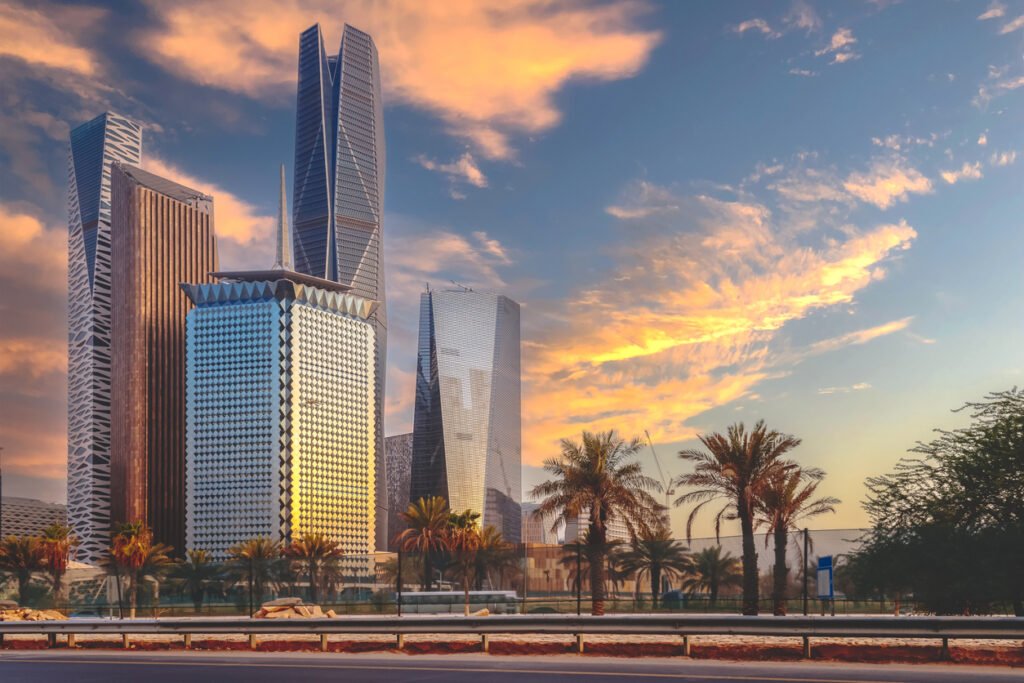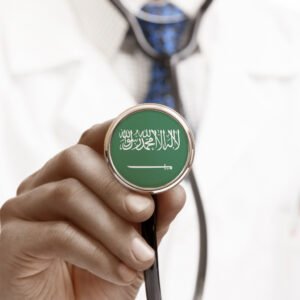Hey there, fellow professionals considering a move to Saudi Arabia! In this post, we’re diving into the basics of life in the Kingdom. We’ll chat about stuff like the cost of living and cultural tidbits to help you get a feel for what it’s really like here. Whether you’re just thinking about it or already planning your move, stick around as we break down the ins and outs of living and working in Saudi Arabia.
Culture and social norms in Saudi Arabia
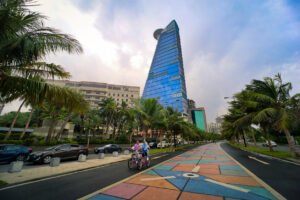
Navigating the cultural landscape of Saudi Arabia as an expat requires an understanding of certain do’s and don’ts, which are deeply rooted in the country’s traditions and Islamic beliefs.
One of the most important aspects to consider is dress code. In public, it’s expected to dress modestly.
For men, this typically means avoiding shorts and sleeveless tops. Women, until recently, were required to wear an abaya, a long, loose robe, but this rule has been relaxed in some parts of the country, particularly in major cities and expat compounds. However, it’s still advisable for women to dress conservatively, covering shoulders and knees.
Public displays of affection are frowned upon, and there are strict rules about interactions between men and women who are not related.
It’s important to always show respect for local customs and religious practices. For example, during the holy month of Ramadan, eating, drinking, or smoking in public during daylight hours is not allowed, as this is a time of fasting for Muslims.
English proficiency in Saudi Arabia varies. In business settings and larger cities, many people speak English, especially among the younger population and in areas frequented by expats. However, in more remote areas and among older generations, English is less common.
Learning basic Arabic phrases can be extremely helpful for everyday interactions and is greatly appreciated by locals. It shows respect for the culture and can make daily life and integration much smoother. Showing the interest of learning Arabic, even just a few words or basic conversational skills, can improve your ability to connect with locals.
Adapting to the local culture can take time, but being open-minded and respectful goes a long way. Expats should take the time to learn about Saudi customs, traditions, and history.
Engaging with the local community through social or community events can be a good way to immerse yourself in the culture. Attending cultural festivals, trying local cuisine, and visiting historical sites can also provide deeper insights into Saudi life and traditions.
Networking can often start within expat communities, where you might find locals interested in cultural exchange. Workplaces are also common grounds for building relationships.
Cost of living
Understanding the cost of living in Saudi Arabia is essential for expats planning to move to the Kingdom. Expenses can vary depending on factors such as city of residence, lifestyle choices, and family size.
In major cities like Riyadh, Jeddah, or Dammam, expats can expect to spend approximately 1,800 to 2,700 EUR per month to maintain a comfortable standard of living. This estimate may fluctuate based on individual preferences and requirements, such as housing preferences and leisure activities.
Riyadh, as the capital and a major business center, tends to have higher living costs compared to other cities. Jeddah, known for its vibrant culture and seaside charm, also reflects similar expenses. Dammam, situated in the Eastern Province and a significant economic hub, offers relatively lower living costs but still requires careful budgeting.
For daily expenses, groceries typically amount to around 180 to 270 EUR per month for a single person. Dining out at average restaurants can cost approximately 9 to 14 EUR per meal, depending on the location and type of cuisine.
Transportation costs vary based on personal preferences and usage. While fuel prices are relatively low in Saudi Arabia, the initial cost of purchasing a car and ongoing maintenance should be factored in. Monthly transportation expenses may range from 90 to 180 EUR, depending on whether expats choose to drive or use public transport.
Overall, understanding the cost of living in Saudi Arabia enables expats to make informed decisions and plan their budget accordingly, ensuring a smooth transition and enjoyable experience in the Kingdom.
Here are some examples of basic daily grocery prices in Saudi Arabia:
- 1 liter of milk: Approximately 2 SAR (0.45 EUR)
- 1 kilogram of rice: Around 4-6 SAR (0.90-1.35 EUR)
- 1 kilogram of chicken breast: Approximately 15-20 SAR (3.35-4.45 EUR)
- 1 dozen eggs: Around 8-10 SAR (1.80-2.25 EUR)
- 1 kilogram of tomatoes: Approximately 3-5 SAR (0.70-1.15 EUR)
- 1 kilogram of potatoes: Around 2-4 SAR (0.45-0.90 EUR)
- 1 kilogram of bananas: Approximately 4-6 SAR (0.90-1.35 EUR)
- 1 kilogram of apples: Around 6-8 SAR (1.35-1.80 EUR)
- 1 loaf of bread: Approximately 2-3 SAR (0.45-0.70 EUR)
- 1 kilogram of onions: Around 2-4 SAR (0.45-0.90 EUR)
Please note that these prices are approximate and may vary depending on the location and time of purchase.
Most of the job positions we offer at Holistically for healthcare professionals include in their package housing and transportation. Check out our Jobs sections to find out all the vacancies!
Social and leisure activities in Saudi Arabia
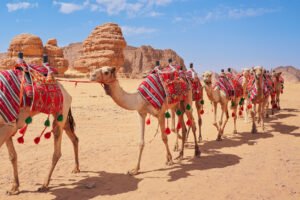
Exploring leisure activities in Saudi Arabia offers a unique experience shaped by the country’s cultural and religious context.
Sports enthusiasts will find soccer as the top choice, alongside activities like swimming, tennis, and golf, which are pretty popular among expats.
Venturing into the vast desert landscape promises thrilling experiences like dune bashing, camel riding, and desert camping—a true taste of Saudi Arabia’s authenticity.
With its stunning coastline along the Red Sea and the Persian Gulf, water sports like scuba diving, snorkeling, and fishing are weekend favorites, especially in places like Jeddah, known for its vibrant aquatic life.
Connecting with others often happens through expat clubs, organizing social events and sports leagues—great for making new friends and settling into Saudi life.
When it comes to nightlife, think less about Western-style parties and more about traditional entertainment like dining out or chilling at coffee shops.
And while cinemas have made a comeback in recent years, socializing here often centers around family gatherings, cafe visits, or cultural events.
Just remember, social norms lean toward conservatism, and public mixing of genders is regulated, making socializing a bit different from what you might be used to.
But don’t worry, whether mingling with locals or fellow expats, embracing these cultural nuances can lead to some incredible friendships and a deeper appreciation of Saudi life.
Transportation system in Saudi Arabia
Transportation in Saudi Arabia offers a variety of options for expats, each with its own set of considerations.
Public transportation in Saudi Arabia is growing, particularly in major cities like Riyadh and Jeddah. The country has been investing in improving its public transit systems, including buses and metro services. In Riyadh, for example, a new metro system is being developed, which promises to be a game-changer for public transportation.

However, the reach of public transportation is still somewhat limited when compared to other countries, so its reliability can vary depending on your location and destination.
Buses are the most common form of public transport. They are affordable and connect major cities and towns. The intercity bus service, operated by the Saudi Arabian Public Transport Company (SAPTCO), is quite efficient and comfortable. In cities, local buses are available, but their routes can be confusing for newcomers.
Traffic conditions in Saudi Arabia can be challenging, especially in big cities like Riyadh, Jeddah, and Dammam. Peak hours usually see heavy traffic, and driving behavior can be aggressive compared to what you might be used to.
Road conditions are generally good, especially on major highways and in urban areas. However, in more remote areas, road quality can deteriorate, and sandstorms can occasionally affect visibility and road safety.
If you’re considering driving in Saudi Arabia, you’ll need a local driving license.
Expats can use an international driving permit for a limited time before they are required to obtain a Saudi license. The process involves a driving test and a computer-based test on local traffic laws.
It’s important to note that Saudi Arabia has strict traffic laws, and violations can result in hefty fines.
For many expats, owning a car is the most convenient option, offering more flexibility and freedom of movement. Fuel costs are relatively low in Saudi Arabia, making car ownership more affordable than in many other countries.
Car rental services are also widely available and can be a good option for short-term needs.
Education system in Saudi Arabia
Saudi Arabia can be a family-friendly destination for expats, offering various options to meet your family’s needs, especially in terms of education.
In major cities like Riyadh, Jeddah, and Dammam, you’ll find a wide range of international schools catering to expat families. These schools typically follow American, British, or International Baccalaureate (IB) curriculums, providing an educational environment similar to what children experience in their home countries.
Notable institutions include the British International School of Riyadh, the American International School of Jeddah, and the Dhahran International School. Designed to meet the needs of expatriate children, these schools offer a diverse cultural environment, fostering international exposure and learning in a multicultural setting.
However, it’s essential to consider the associated costs. Tuition fees range from approximately 5,000 to 25,000 EUR per year, depending on factors such as the school’s reputation, location, and the student’s grade level. Additional fees for enrolment, uniforms, books, and extracurricular activities are also common.
For families exploring local schools, it’s important to understand that the education system follows the Saudi national curriculum and is primarily taught in Arabic. This can pose a significant cultural and linguistic adjustment for expat children. Nonetheless, attending a local school offers an immersive experience in Saudi culture and language, which may be beneficial for those planning a long-term stay in the country.
Alternatively, private schools providing a modified version of the Saudi curriculum with additional English language instruction offer a middle ground. While more affordable than international schools, they still provide a level of international exposure for expat families.
Work and business
The job market in Saudi Arabia offers unique opportunities and characteristics for expats.
Traditionally, the country has been a favoured destination for expatriates, especially in lucrative sectors such as oil and gas, construction, healthcare, and education.
Expats often secure high-skilled positions, particularly in the oil and gas industry, which is integral to the Saudi economy. The construction sector also presents abundant opportunities due to ongoing infrastructure projects.
Healthcare professionals, including doctors, nurses, and medical technicians, are in demand, along with roles in the education sector, particularly in international schools and universities.
However, some job sectors are reserved for Saudi nationals as part of the Saudisation policy, aimed at boosting employment among locals. Positions in human resources, certain retail roles, and media are typically restricted to Saudis, necessitating awareness of evolving regulations.
While Arabic is the official language, English is widely used in business settings, making it essential for expats. Nonetheless, familiarity with Arabic can be advantageous, especially when dealing with local entities.
Securing employment in Saudi Arabia requires a work permit, typically sponsored by the employer. This involves obtaining a visa, supported by a contract from a Saudi company and requisite documents like educational certificates and medical reports, typically managed by the employer.
Entrepreneurial opportunities exist for expats, albeit with challenges. Despite government efforts to enhance the business environment and attract foreign investment, complexities remain, including requirements for local partnerships and navigating legal regulations.
If you are looking for great job opportunities in the healthcare sector, check out our Jobs page!
Banking and finance
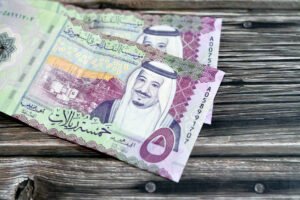
The banking system in Saudi Arabia is recognised for its modernity, strength, and extensive range of services, operating primarily in the local currency, Saudi Riyals (SAR). Aligning with international banking standards and regulations, these services cater to expatriates with a variety of financial needs.
For expats seeking to open a bank account in Saudi Arabia, the process is generally straightforward but requires specific documentation. Typically, this includes a valid residency permit (Iqama), a letter of employment from a Saudi employer, and potentially a ‘no objection certificate’ (NOC) from the sponsor. Additional documents, such as a salary certificate or proof of address, may be requested by some banks, so it’s advisable to verify requirements with the respective institution.
Once the necessary documents are in order, the account opening process is typically seamless. Major banks in Saudi Arabia cater to expats by offering tailored services, including multi-currency accounts, international money transfers, and English-language customer support.
The banking services available in Saudi Arabia encompass a wide array, including savings and current accounts, credit and debit cards, loans, mortgages, and investment services. Many banks also provide Sharia-compliant banking options, adhering to Islamic finance principles.
Online banking is prevalent and user-friendly, with banks offering intuitive apps and web platforms for various transactions, such as fund transfers and bill payments. This digital transition has been accelerated by the government’s Vision 2030 initiative, which emphasises digital infrastructure as part of economic diversification efforts.
ATM accessibility is widespread, particularly in urban areas, with machines located in banks, shopping malls, airports, and other public spaces. These ATMs are typically part of a network facilitating easy access to funds.
While money transfers to and from Saudi Arabia are generally straightforward, regulations exist to prevent illicit activities, which may require additional documentation or scrutiny for large transactions. Proof of fund source or transfer purpose may be requested by banks in such cases.
For expats relocating to Saudi Arabia, tax and financial planning are crucial considerations. While expatriates are not subject to personal income tax in Saudi Arabia, understanding tax obligations in their home country is essential, especially for nations taxing worldwide income. Moreover, the implementation of Value Added Tax (VAT) in Saudi Arabia and potential reporting requirements for foreign bank accounts in expats’ home countries should be considered for comprehensive financial planning.
As of current exchange rates, 1 Saudi Riyal (SAR) is approximately equivalent to 0.24 Euros (EUR).
Safety and Security
Saudi Arabia is widely regarded as a safe destination for expatriates, boasting a relatively low crime rate compared to many other countries. However, like any nation, it has its unique safety considerations and cultural nuances that expats should be mindful of.
Notably, Saudi Arabia’s stringent legal system, rooted in Islamic law, contributes to lower levels of certain crimes such as theft and vandalism, which are less prevalent compared to Western countries. However, this also means strict laws and penalties for actions that might be perceived as minor offenses elsewhere. For instance, alcohol is strictly prohibited, and there are stringent decency regulations governing attire and conduct.
In terms of specific crimes, cybercrime, including phishing and online scams, is a growing concern globally. Expats should exercise caution when sharing personal information online and remain vigilant against common fraudulent tactics.
While major cities like Riyadh, Jeddah, and Dhahran are generally considered safe with established expat communities, basic urban safety precautions should still be observed. It’s advisable to avoid walking alone at night in less populated or poorly lit areas.
While isolated incidents may occur, Saudi Arabia is generally considered a safe place for expatriates. It’s essential for expats to remain vigilant, adhere to local laws and customs, and stay informed about their surroundings. Additionally, registering with their embassy or consulate upon arrival can provide expats with additional support in case of emergencies. With proper precautions and awareness, expatriates can enjoy a secure and comfortable living experience in Saudi Arabia.
Religion and spirituality
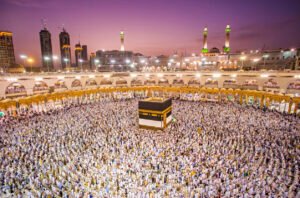
Islam is the predominant religion in Saudi Arabia, deeply woven into the fabric of its culture, legal system, and daily routines. The birthplace of Islam, the country is home to its two holiest cities, Mecca and Medina, where religion holds profound significance in both public and private spheres.
The majority of Saudis adhere to Islam, with many practicing devoutly. Islamic teachings influence various aspects of life, shaping business practices, educational frameworks, and legal structures.
The rhythm of daily life revolves around the Islamic prayer schedule, with five prayers observed each day. During prayer times, businesses typically close, and individuals gather for prayer at mosques or designated areas.
In terms of religious diversity, Saudi Arabia functions as an Islamic state, limiting public expressions of religions other than Islam. Public places of worship, such as churches or temples, for non-Islamic faiths are not permitted, and proselytizing by non-Muslims is strictly prohibited under the law.
However, expatriates are afforded the freedom to practice their own religions within private settings, such as homes or expatriate compounds. Many expat communities organize informal gatherings or religious services within these private spaces, facilitated through networking, social media, or embassy contacts.
Maintaining discretion and respect for local Islamic traditions and customs is advised for expatriates. For instance, during Ramadan, it’s customary to refrain from eating, drinking, or smoking in public during daylight hours, out of respect for Muslims observing the fasting period.
Climate and environment

Saudi Arabia’s climate exhibits regional variations, impacting lifestyle choices, health considerations, and environmental factors across the country.
Overall, the nation experiences a desert climate typified by scorching daytime temperatures and cooler nights, although nuances exist in different areas.
In the central region, including Riyadh, summers sizzle with temperatures often surpassing 45°C (113°F), while winters are relatively mild. Coastal locales like Jeddah and Dammam offer slightly moderated climates but contend with high humidity, intensifying the perception of heat. Conversely, the southwestern region, such as Asir Province, boasts a more temperate climate with increased rainfall, providing a reprieve from the blistering summer heat.
From May to September, the hot season demands precautions against heat-related illnesses like heatstroke and dehydration, limiting outdoor activities to cooler hours. The cooler season, spanning November to February, offers milder weather conducive to outdoor pursuits and exploration.
While tropical diseases are not prevalent, respiratory ailments may arise due to sand and dust storms, particularly in spring. Rainfall patterns vary, with the Asir region experiencing notable precipitation during the monsoon season from June to September, sometimes leading to flash floods.
Concerns about air quality in urban areas near industrial zones persist, although access to clean water remains generally reliable, owing to advanced water management systems.
While Saudi Arabia is not prone to frequent natural disasters, occasional earthquakes occur in the west, and flash floods pose a risk during the rainy season, primarily in non-traditionally rainy areas.
The country’s climate significantly shapes expat activities and lifestyles. During the scorching months, indoor pursuits are favored, with evenings reserved for shopping, dining, and socialising. Conversely, cooler temperatures in the winter months offer an inviting backdrop for outdoor adventures, domestic travel, and engagement in local festivities.

